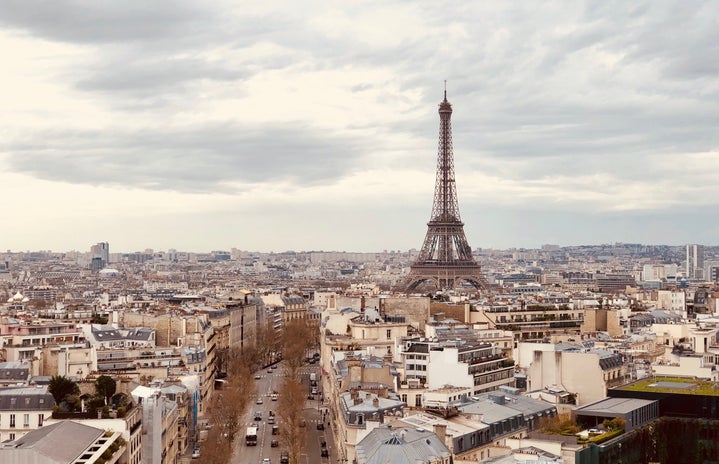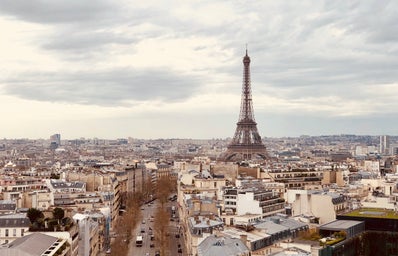On October 2, 2020, Netflix released the debut season of the highly anticipated series Emily in Paris. Not only does Lilly Collins play the titular role of Emily Cooper, but Darren Star, the renowned creator of Sex and the City, directed and produced the show. In the series, Emily Cooper, a marketing executive from Chicago, is sent to work for the French marketing firm Savoir because her French-speaking boss has to decline the position due to an unexpected pregnancy. Viewers spend the next ten episodes watching Emily try to navigate the foreign city, prove herself to her colleagues, and balance a complex web of relationships. I want to discuss the series’ highlights as well as its low points to help you decide if it is worth watching.
Highlight: Fashion and Aesthetic Value
One of my favorite elements of the show is its aesthetic beauty. The series features breathtaking shots of the City of Lights. It truly looks as if Emily is living in a daydream, complete with perfect pastel color palettes and plump, mouthwatering pastries. Additionally, Emily and her friends’ effervescent fashion choices are visually stunning. Although Emily’s style may not be up everyone’s alley, I admire the bold risks she takes and her use of both color and prints. I also loved that Emily’s fashion was used as a device to mirror her personal growth. While she starts the show wearing a tacky Eiffel Tower blouse and a slew of berets, she gradually outgrows these clichés as a result of her increasing cultural cognizance. The aesthetic beauty of Emily in Paris is something I found appealing about the show because it transported me into my own reverie.
Low Point: Cultural Stereotypes
Despite my previous praise for the aesthetic representation of Paris, many critics have spoken out to condemn the show for its simplistic portrait of French culture. Some critics, for instance, have taken an issue with the scenery, saying that it is not an accurate representation of Paris. Despite the show’s appealing aesthetic, I do have to admit that no city looks like the utopia of Emily in Paris’ version of Paris. Paris is not just a fantasy land for Americans, but a place teeming with culture and history that should be presented as such. Another issue was the characterization of the French characters as lazy, overly flirtatious, and disloyal. Throughout the show, side characters make generalizing remarks about the French as a people that surely do not apply to everyone such as, “The French are romantics, but also realists.” This cultural ignorance pervades the show and makes it hard to digest at times.
Highlight: Voyeuristic Escapism
My main takeaway from Emily in Paris was the feeling I got while watching it. In the show, Emily is practically living a fantasy—she has a creative, well-paying, high-level job. She never wears the same outfit, she gets to live in a beautiful, romantic city in the world, and she has gorgeous Parisian men fawning over her constantly. Through Emily, the viewer, currently in a pandemic-stricken alternate universe, gets to experience life in a way that is currently impossible. If the viewer is single and feeling lonely, she can find solace watching hunky guys pursue Emily. If the viewer is sad that her study abroad program got canceled, she can live out her overseas dreams vicariously through Emily.
Low Point: The Perfect Protagonist
Keeping the above section in mind, there is a major flaw in identifying with Emily—her reality is simply unrealistic. While watching the show, I could not help but compare Emily to Elle Woods from Legally Blonde. Both characters are beautiful, successful, albeit ditzy, women for whom things always seem to work out. For example, when Emily books a reservation at a high-profile restaurant only to find out that she selected the wrong date, she conveniently calls her hot French neighbor, who just happens to be a chef, and asks him to cook them dinner. As I watched Emily dig herself out of holes by sheer luck and likability, I began to recognize how unrelatable Emily is. Although the viewer is supposed to identify with her, it’s hard to do that because most people have to work hard to clean up their messes. I think that characters like Emily can be dangerous role models because their realities are anything but realistic.
All in all, I would recommend Emily in Paris, but I would not say that it is a meaningful or groundbreaking show by any means. Yes, it’s nice to escape to a simpler, more beautiful life, especially when the world around us feels like it’s crumbling down. However, it is important to take note of the show’s shortcomings and be wary of internalizing the perpetuated clichés. No one is perfect, and we all have something to learn from one another.



